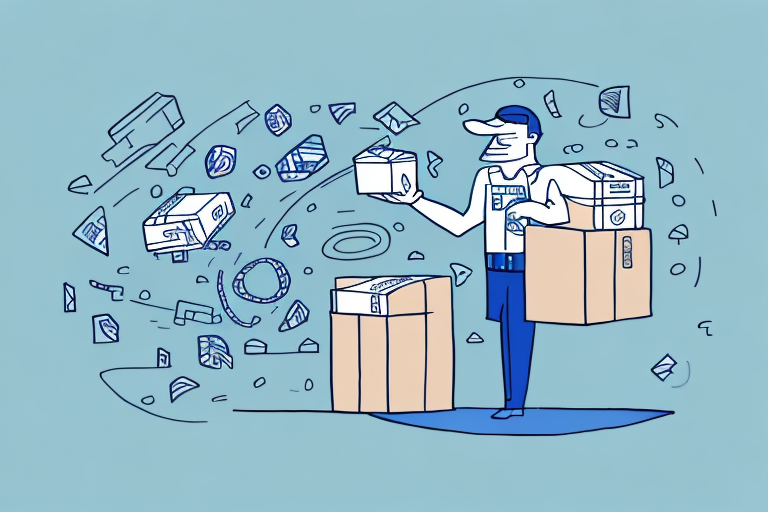Becoming an Independent Courier Contractor: What You Need to Know
Are you considering becoming an independent courier contractor? This can be a rewarding career choice for those who are self-motivated, organized, and enjoy driving. However, before you dive into this profession, it's essential to understand the advantages, risks, and challenges that come with it. In this comprehensive guide, we'll cover all the details you need to know to succeed as an independent courier contractor.
Advantages of Being an Independent Courier Contractor
Flexibility and Autonomy
One of the primary advantages of being an independent courier contractor is the flexibility it offers. You have the ability to set your own schedule, allowing you to balance work with personal commitments. This autonomy means you can choose the hours you work and the types of deliveries you accept, providing a level of independence that is highly appealing to many.
Potential for High Earnings
Independent courier contractors have the potential to earn a substantial income. Many companies pay per delivery, so your earnings can increase with efficiency and the number of deliveries you complete daily. According to the U.S. Bureau of Labor Statistics, the median annual wage for delivery drivers was approximately $36,000 in 2022, with the potential for higher earnings based on performance.
Diverse Working Locations
As an independent courier, you can choose to operate in specific areas or expand your services to cover a broader region. This flexibility allows you to tailor your business to areas with higher demand or less competition, potentially increasing your client base and income.
Opportunities for Growth
Starting as an independent courier contractor can open doors to personal and professional growth. As your business expands, you may have the opportunity to hire additional couriers, diversify your service offerings, or even establish a courier company. This scalability can lead to significant income growth and business satisfaction.
Risks and Challenges of Independent Courier Contracting
Physical Demands
The role of a courier often involves extensive driving and the handling of packages, which can be physically demanding. Long hours behind the wheel can lead to fatigue, while moving heavy or bulky items can result in physical strain or injury. It's crucial to maintain physical fitness and adopt safe handling practices to mitigate these risks.
Risk of Accidents and Liability
Frequent driving increases the risk of accidents, which can lead to vehicle damage, personal injury, or legal liabilities. Additionally, delivering valuable or fragile items adds to the risk of damage or loss. It's advisable to invest in comprehensive insurance coverage and implement safety measures to protect yourself and your business.
Theft and Package Security
Courier contractors are often targets for theft, whether it's the packages being delivered or items stored in the vehicle. Implementing security measures such as secure locks, GPS tracking, and surveillance cameras can help reduce the risk of theft. Additionally, maintaining good relationships with clients can enhance trust and deter potential theft.
Financial Instability
Income as an independent courier can be unpredictable, fluctuating based on the number of deliveries and contracts secured. It's essential to have a solid financial plan, including savings and budgeting strategies, to manage periods with lower income. Diversifying your client base can also provide more consistent revenue streams.
Starting Your Independent Courier Contracting Business
Market Research and Business Planning
Before launching your courier business, conduct thorough market research to assess the demand for services in your area and understand the competitive landscape. Identify your target market, potential clients, and unique selling points. Developing a detailed business plan will help you outline your business goals, strategies, and financial projections.
Legal Structure and Registration
Choose an appropriate legal structure for your business, such as a sole proprietorship, limited liability company (LLC), or corporation. Each structure has different implications for taxes, liability, and regulatory requirements. Register your business with the relevant local and state authorities to ensure compliance with all legal obligations.
Licenses and Permits
Depending on your location and the nature of your deliveries, you may need specific licenses and permits to operate legally. Common requirements include a general business license, vehicle registration, and commercial driving permits. Check with your local government offices to determine the exact requirements for your area.
Choosing the Right Vehicle and Equipment
Your choice of vehicle is critical to the success of your courier business. Consider the types of packages you will be delivering and choose a vehicle that accommodates their size and weight. Additionally, invest in essential equipment such as GPS navigation systems, hand trucks, and secure storage solutions to enhance your efficiency and reliability.
Essential Equipment and Tools for Independent Courier Contractors
Reliable Vehicle
A dependable vehicle is the cornerstone of your courier business. Whether you opt for a car, van, or truck, ensure it is well-maintained to minimize downtime and repair costs. Fuel efficiency is also a key consideration to keep operational costs low.
Navigation and Tracking Systems
Accurate navigation tools, such as GPS systems or reliable navigation apps, are essential for timely deliveries. Additionally, implementing a tracking system can help monitor your deliveries, providing transparency and accountability to your clients.
Handling Equipment
Tools like dollies, hand trucks, and straps are necessary for safely transporting packages, especially larger or heavier items. Investing in quality handling equipment can reduce the risk of injury and damage to packages.
Delivery Management Software
Utilizing delivery management software can streamline your operations by organizing delivery routes, scheduling pickups, and managing invoices. Platforms like Heavy.ai offer comprehensive solutions for independent contractors.
Legal Requirements for Starting an Independent Courier Contracting Business
Business Registration
Register your business name with the appropriate government agencies to establish your legal identity. This step is crucial for branding and legal protection purposes.
Insurance Coverage
Comprehensive insurance is vital to protect your business against potential liabilities. Consider policies that cover vehicle insurance, general liability, and cargo insurance to safeguard your assets and operations.
Tax Obligations
As an independent contractor, you are responsible for managing your taxes. Keep accurate financial records and consider consulting with a tax professional to ensure compliance with all tax laws and to take advantage of possible deductions.
Marketing Your Independent Courier Contracting Business
Establishing an Online Presence
A professional website is essential for attracting clients and showcasing your services. Include important information such as service offerings, contact details, and testimonials. Additionally, utilize search engine optimization (SEO) strategies to improve your website's visibility on search engines.
Networking with Local Businesses
Building relationships with local businesses can lead to steady contracts and referrals. Attend local business events, join industry associations, and reach out to potential clients through targeted marketing efforts.
Leveraging Social Media
Social media platforms like LinkedIn, Facebook, and Instagram can be powerful tools for marketing your courier services. Share updates, engage with followers, and run targeted advertising campaigns to reach a broader audience.
Online Directories and Listings
Register your business with online directories such as Google My Business, Yelp, and industry-specific platforms. Being listed on these directories enhances your online visibility and makes it easier for potential clients to find and contact you.
Managing Your Time Effectively as an Independent Courier Contractor
Strategic Scheduling
Effective time management is crucial for maximizing productivity and ensuring timely deliveries. Plan your routes strategically to minimize travel time and fuel costs. Utilize scheduling tools to organize your daily tasks and maintain a balanced workload.
Utilizing Technology
Adopt technology solutions such as mobile apps for route optimization, delivery tracking, and client communication. These tools can significantly improve your efficiency and reduce the likelihood of errors.
Setting Realistic Goals
Establish achievable goals for your courier business, such as the number of deliveries per day or weekly income targets. Setting realistic expectations helps you stay motivated and track your progress effectively.
Building Strong Relationships with Clients
Providing Excellent Customer Service
Exceptional customer service is key to retaining clients and generating positive word-of-mouth referrals. Communicate clearly, meet delivery deadlines, and handle packages with care to build a reputation for reliability and professionalism.
Maintaining Open Communication
Keep clients informed about the status of their deliveries through regular updates and proactive communication. This transparency fosters trust and ensures client satisfaction.
Personalizing Your Services
Offer personalized solutions tailored to your clients' specific needs. Whether it’s providing flexible delivery options or handling special requests, customization can differentiate your services from competitors.
Strategies for Growing Your Independent Courier Contracting Business
Expanding Service Offerings
Diversify your services by offering specialized deliveries such as same-day shipping, refrigerated transport, or handling fragile items. Catering to niche markets can attract a wider range of clients and increase your revenue streams.
Increasing Your Service Area
Gradually expand the geographic area you cover to reach more clients. Research new markets to identify areas with high demand and low competition to maximize growth opportunities.
Hiring Additional Couriers
As your business grows, consider hiring additional couriers to handle increased demand. Building a reliable team allows you to take on more contracts and scale your operations effectively.
Forming Strategic Partnerships
Partner with local businesses, e-commerce platforms, and logistics companies to secure steady contracts and enhance your service offerings. Collaborative partnerships can provide mutual benefits and expand your client base.
Setting Competitive Rates as an Independent Courier Contractor
Calculating Operating Costs
Determine your operating costs, including vehicle maintenance, fuel, insurance, and equipment. Understanding your expenses is crucial for setting rates that ensure profitability while remaining competitive.
Analyzing Market Rates
Research the rates charged by other courier services in your area to establish competitive pricing. Consider factors such as delivery distance, package size, and delivery speed when setting your rates.
Offering Premium Services
Differentiate your business by offering premium services that justify higher rates. Services such as guaranteed delivery times, handling of high-value items, or customizable delivery options can attract clients willing to pay more for added value.
Flexible Pricing Strategies
Implement flexible pricing strategies, such as volume discounts or tiered pricing based on delivery speed. Flexible rates can attract a broader range of clients and accommodate different budget levels.
Opportunities for Expansion and Diversification in the Independent Courier Industry
Specializing in Niche Markets
Focus on specific industries or types of deliveries, such as medical supplies, legal documents, or perishable goods. Specialization can position your business as an expert in a particular field, attracting clients with specialized needs.
Offering Additional Services
Expand your service offerings by providing complementary services such as packaging, warehousing, or inventory management. These added services can create additional revenue streams and enhance client satisfaction.
Adopting Green Delivery Practices
Implement eco-friendly delivery practices, such as using electric vehicles or optimizing delivery routes to reduce carbon emissions. Sustainable practices can appeal to environmentally conscious clients and differentiate your business in the market.
Managing Your Finances as an Independent Courier Contractor
Tracking Income and Expenses
Maintain accurate records of all income and expenses to monitor your financial health. Use accounting software like QuickBooks or FreshBooks to streamline financial management.
Budgeting and Financial Planning
Create a detailed budget that outlines your expected revenues and expenses. Regularly review and adjust your budget to ensure you are meeting financial goals and managing costs effectively.
Tax Management
Understand your tax obligations as an independent contractor, including self-employment taxes and deductible business expenses. Consulting with a tax professional can help you navigate tax laws and maximize deductions.
Accessing Financial Resources
Utilize financial tools and resources such as business loans, lines of credit, and grants to support your business growth. Platforms like SBA offer various funding options tailored to small businesses.
Conclusion: Weighing the Pros and Cons
Becoming an independent courier contractor offers numerous advantages, including flexibility, potential for high earnings, and opportunities for business growth. However, it also comes with challenges such as physical demands, financial instability, and risks associated with driving and package security. By carefully planning, investing in the right tools and equipment, and implementing effective business and marketing strategies, you can navigate these challenges and build a successful courier business. Understanding the benefits and drawbacks will help you make an informed decision and set the foundation for a thriving career as an independent courier contractor.






















